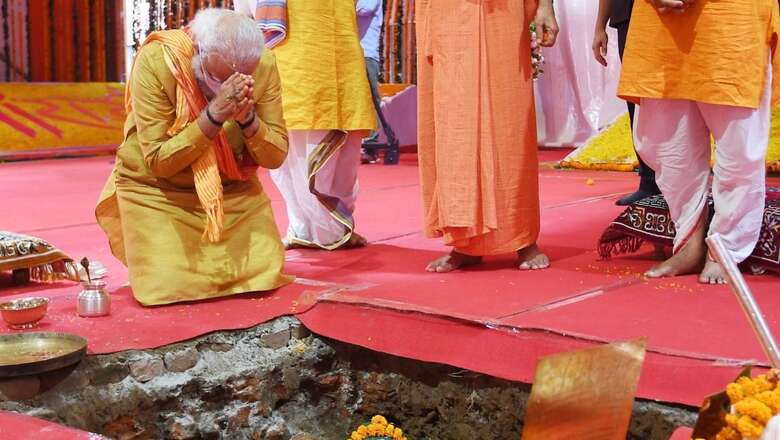
views
The government has decided to launch an online repository called ‘IKS Wiki’ to provide in-depth research and knowledge about the Indian culture and traditions. The vision behind the repository is to provide the people with knowledge about the traditions and culture of India in a simplified way that could be understood by the common man.
Ganti S. Murthy, national coordinator of the Indian Knowledge Systems (IKS) division of the education ministry, said, “It will be an authentic library for Bharatiya Gyan Parampara, or Indian knowledge systems, which will be accessible to everyone in the world”.
The initiative focuses on subjects that are part of the knowledge system developed over many years by people in India. This knowledge has been passed down through writings, manuscripts, oral traditions, and customs.
The government has also initiated an internship programme with IKS for students. Through youth engagement with the IKS, the government wishes to enthuse youth with the culture and traditions.
According to a document released earlier this week, students can also contribute artwork during their time as interns. This artwork can include pictures, sketches, multimedia, cartoons, and graphics for use by the IKS community and general readers. Priority will be given to the “oral traditions of Bharat”.
The goal of the IKS Internship programme is to inspire and motivate young people to pursue more in-depth research on a range of IKS-related subjects, ideally in ‘Bharatiya Bhashas’ (Indian languages).
The document stated that the IKS Wiki “must be an important tool for it”. Thus, the main goal of this internship programme is to give students the chance to participate and add to the IKS Wiki throughout the summer or at any other time of the year.
What is IKS?
The mission of the IKS is to compile a database of people and institutions that have made contributions to the study, teaching, publication, and preservation of rich and ancient Indian knowledge systems.
In addition, it is also intended to provide a portal for the preservation and sharing of this wealth of information. It should also be open to the public and maintained in a PPP fashion, much like a Wiki.
The IKS division was established by the ministry as an innovation cell at the All India Council for Technical Education in 2020 to promote interdisciplinary research on aspects of indigenous knowledge.
Preservation of Culture, Faith & Tradition
India is incredibly diverse, with many languages and cultures. Despite these differences, there is a shared bond through ancient traditions and values. To strengthen this bond, people from various regions and backgrounds need to engage more with each other and become aware of the traditions and culture practised throughout the country. This will promote understanding, unity, and a broader set of values across different states in India.
The IKS is one of many initiatives launched by the Indian government to promote such relationships. The aim is to foster a cultural resurgence that recognises the importance of tradition and culture. The Ek Bharat Shresth Bharat Programme in 2015, the Aadi Mahotsav in 2017 and the Guru Shishya Parampara Scheme in 2016 are examples of government initiatives to preserve and promote cultures and traditions.
Moreover, the institutions of the Ministry of Culture such as academies — Sangeet Natak Akademi (SNA), Centre for Cultural Resources and Training (CCRT), Kalakshetra Foundation (KF), Indira Gandhi National Centre for the Arts (IGNCA), National School of Drama (NSD), Sahitya Akademi (SA), and Lalit Kala Akademi (LKA) are engaged in the work of preserving and promoting the traditional cultural heritage of India.
The Ministry of Culture developed a scheme titled ‘Scheme for Safeguarding the Intangible Heritage and Diverse Cultural Traditions of India’ with the goal of reinvigorating and revitalising various institutions, groups, individuals, identified non-MOC institutions, non-government organisations, researchers, and scholars so that they can engage in activities and projects to strengthen, protect, preserve, and promote India’s rich intangible cultural heritage.
Furthermore, under the 2003 Convention, India successfully inscribed 13 Intangible Cultural Heritage (ICH) items on the UNESCO Representative list of Intangible Cultural Heritage of Humanity.
State governments throughout the country have also launched initiatives to preserve their cultures and traditions in the respective states.
Odisha
The state government has constituted Special Development Councils (SDC), as announced by Chief Minister Naveen Patnaik, with a total grant of Rs 351 crore for the current fiscal. The aim of the SDC is to preserve the tribal language, art, culture, and heritage in Odisha.
Arunachal Pradesh
Pema Khandu, the Arunachal Pradesh Chief Minister, has pledged to preserve the rich cultural heritage of the state. Over the last five years, the state government has spent Rs 200 crore to preserve the indigenous faith and culture of the state. Every year, the ‘Indigenous Faith Day’ is observed to celebrate the unique culture of the state.
Assam
On July 30, 2021, the Assam government inducted the Indigenous and Tribal Faith and Culture Department to promote and preserve tribal history and heritage. By doing so, Assam became only the second state in the northeast with a department for the preservation of faith and culture. This year, the state government has allocated Rs 425 crore to preserve the tribal faith and culture.
All the states and UTs in India are recipients of such initiatives and schemes launched by the central and respective governments.
Promoting Indian Culture Internationally
By showcasing the elements of its culture and tradition internationally, India contributes to the global tapestry of cultural richness, fostering an appreciation for diversity.
It also helps build bridges of understanding between nations and peoples. It allows for a deeper appreciation of the similarities and differences between cultures, promoting mutual respect and harmony in the global community.
Therefore, to promote its culture and tradition internationally, the government has taken numerous initiatives, including cultural exchange programmes, cultural festivals and exchange scholarships.
UTIKS Portal: ‘Universalisation of Traditional Indian Knowledge System’ is an online platform developed by the Indian Council for Cultural Relations in collaboration with Savitribai Phule University. This online platform is for short courses on traditional Indian knowledge.
International Yoga Day: The government celebrates International Yoga Day, which is observed annually on June 21. Yoga, an ancient Indian practice, is promoted for its physical, mental, and spiritual benefits. Yoga sessions and seminars are organised throughout the world, allowing individuals from all walks of life to participate and enjoy the comprehensive advantages of yoga. This event strengthens cultural linkages between India and promotes worldwide health and well-being.
Festival of India: The ‘Festival of India Abroad’ is an initiative that promotes India’s cultural heritage in foreign countries. It comprises the international exchange of Indian art, music, dance, and exhibitions. The programme gives people from all around the world a first-hand look into the Indian culture, resulting in greater cultural understanding. It works under the aegis of the Global Engagement Scheme of the Indian government.
Cultural Exchange Scholarships: In order to foster intellectual cultural exchange, the Indian government offers scholarships and exchange programmes to students and researchers from other countries. These scholarships are available in a variety of academic disciplines, including the humanities, sciences, and arts. In addition to providing financial assistance, the scholarships encourage recipients to interact with the local communities and traditions.
India’s Soft Power Projection, Cultural Diplomacy
Cultural promotion serves as a form of soft power, enhancing a country’s influence on the global stage. By sharing its cultural heritage, India has created positive perceptions, strengthened diplomatic ties, and fostered goodwill, which can be valuable in diplomatic relations.
India ranks 28th in the Soft Power Index released by Brand Finance, the world’s top independent brand valuation and strategy consultancy.
The government has showcased India’s diverse cultural identity and traditional values on various international platforms, with the latest being at the G20 summit.
Two important Indian philosophies, ‘Vasudhaiva Kutumbakam’ (the world is one family) and ‘Atithi Devo Bhava’ (the guest is God), played a role in the success of various G20 summits held in different Indian states and Union Territories throughout the year.
Other Examples of India’s Soft Power
Bollywood: Bollywood plays a key role too. India’s film and music industry produces a record number of movies each year. One of its many successes in forging better relations was the immense fame achieved by Raj Kapoor in the erstwhile Soviet Union. Bollywood movies and songs still remain popular in Russia and have also gained fame in the West due to the rising Indian diaspora there.
Indian Diaspora: There are roughly 30 million Indians living abroad. They mainly live in the UAE, Gulf, US, Canada, and the UK. Over the last 20 years, their number has doubled, making them a significant economic force. In 2022, they sent €104 billion in remittances, making India the top receiver of money and goods from migrants worldwide. A huge diaspora provides foreign countries with a domestic understanding of India and Indians. The Indian diaspora is one of the best-performing and most influential diaspora’s in the world.
With a median household income of about $150,000 per year, Indians are America’s highest-earning migrant group. This is more than double the national average and much ahead of Chinese migrants, who had a median household income of more than $95,000. The typical household income among Indian migrants in Australia is close to $87,000 per year, compared to an average of around $62,000 across all households and about $58,000 among Chinese-born residents.
Incredible India: The Incredible India tourism campaign played a critical role in establishing ‘Brand India’. People from all over the world are drawn to the country’s vibrant democracy, autonomous judiciary, involvement of NGOs, and progressive and independent media. India is also looking for worldwide recognition for remarkable inventive projects that demonstrate India’s connection to her beautiful civilisational history. India has been a firm supporter of inter-civilisational and inter-cultural exchange and one of UNESCO’s most illustrious members.
South Asia Satellite: India’s strength in space technology is a significant soft power tool, offering endless possibilities. Launching the GSAT-9, or South Asia Satellite, showcases India’s regional diplomacy by providing space services to South Asian countries.
YouTube: India is making waves on YouTube, with 245 million viewers every month. Content creators worldwide are reacting to Indian culture, covering everything from recipes and movies to songs and daily life. It’s a global phenomenon capturing the attention of YouTubers everywhere.
If India effectively utilises its soft power, it can significantly boost its global standing, fostering goodwill and prosperity. In the evolving global order, India has the potential to become a leading soft power in the 21st century. To achieve this, it’s crucial to promote its rich culture and traditions, particularly among the masses, starting with the youth. The launch of the IKS Wiki is a noteworthy step in this direction.



















Comments
0 comment